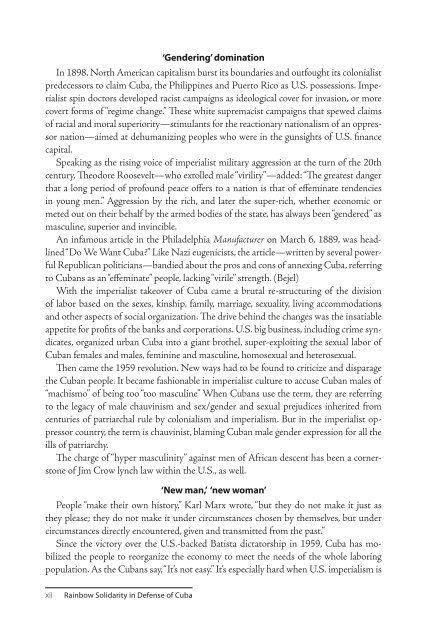LavenderRed_Cubabook
LavenderRed_Cubabook
LavenderRed_Cubabook
You also want an ePaper? Increase the reach of your titles
YUMPU automatically turns print PDFs into web optimized ePapers that Google loves.
‘Gendering’ domination<br />
In 1898, North American capitalism burst its boundaries and outfought its colonialist<br />
predecessors to claim Cuba, the Philippines and Puerto Rico as U.S. possessions. Imperialist<br />
spin doctors developed racist campaigns as ideological cover for invasion, or more<br />
covert forms of “regime change.” These white supremacist campaigns that spewed claims<br />
of racial and moral superiority—stimulants for the reactionary nationalism of an oppressor<br />
nation—aimed at dehumanizing peoples who were in the gunsights of U.S. finance<br />
capital.<br />
Speaking as the rising voice of imperialist military aggression at the turn of the 20th<br />
century, Theodore Roosevelt—who extolled male “virility”—added: “The greatest danger<br />
that a long period of profound peace offers to a nation is that of effeminate tendencies<br />
in young men.” Aggression by the rich, and later the super-rich, whether economic or<br />
meted out on their behalf by the armed bodies of the state, has always been “gendered” as<br />
masculine, superior and invincible.<br />
An infamous article in the Philadelphia Manufacturer on March 6, 1889, was headlined<br />
“Do We Want Cuba?” Like Nazi eugenicists, the article—written by several powerful<br />
Republican politicians—bandied about the pros and cons of annexing Cuba, referring<br />
to Cubans as an “effeminate” people, lacking “virile” strength. (Bejel)<br />
With the imperialist takeover of Cuba came a brutal re-structuring of the division<br />
of labor based on the sexes, kinship, family, marriage, sexuality, living accommodations<br />
and other aspects of social organization. The drive behind the changes was the insatiable<br />
appetite for profits of the banks and corporations. U.S. big business, including crime syndicates,<br />
organized urban Cuba into a giant brothel, super-exploiting the sexual labor of<br />
Cuban females and males, feminine and masculine, homosexual and heterosexual.<br />
Then came the 1959 revolution. New ways had to be found to criticize and disparage<br />
the Cuban people. It became fashionable in imperialist culture to accuse Cuban males of<br />
“machismo” of being too “too masculine” When Cubans use the term, they are referring<br />
to the legacy of male chauvinism and sex/gender and sexual prejudices inherited from<br />
centuries of patriarchal rule by colonialism and imperialism. But in the imperialist oppressor<br />
country, the term is chauvinist, blaming Cuban male gender expression for all the<br />
ills of patriarchy.<br />
The charge of “hyper masculinity” against men of African descent has been a cornerstone<br />
of Jim Crow lynch law within the U.S., as well.<br />
‘New man,’ ‘new woman’<br />
People “make their own history,” Karl Marx wrote, “but they do not make it just as<br />
they please; they do not make it under circumstances chosen by themselves, but under<br />
circumstances directly encountered, given and transmitted from the past.”<br />
Since the victory over the U.S.-backed Batista dictatorship in 1959, Cuba has mobilized<br />
the people to reorganize the economy to meet the needs of the whole laboring<br />
population. As the Cubans say, “It’s not easy.” It’s especially hard when U.S. imperialism is<br />
xii<br />
Rainbow Solidarity in Defense of Cuba


